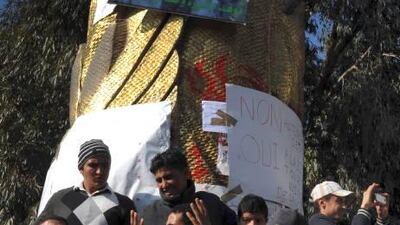TUNIS // A grieving family's gesture of tolerance and reconciliation has drawn a line under the confrontation that sparked Tunisia's revolution and protests across the Arab world.
It began last December when Mohamed Bouazizi, 26, was selling fruits and vegetables from a cart in his hometown of Sidi Bouzid and had his equipment and produce confiscated.
Unable to obtain redress from municipal authorities, the young man set fire to himself and died in hospital on January 5.
It ended on Tuesday when his family withdrew their lawsuit against the female municipality agent accused of humiliating Mr Bouazizi by slapping his face in public.
A judge dismissed the case and ordered the woman to be released.
Mr Bouazizi's family still say that the agent, Fadia Hamdi, bears responsibility for Mohamed's death, but they withdrew the lawsuit in what they describe as a gesture of reconciliation in a time of upheaval.
"Mohamed died for freedom and dignity," said Mr Bouazizi's sister Leila, 24. "We want to complete his gesture by calling for tolerance."
In an interview in January with The National, Mr Bouazizi's family said that he had suffered years of harassment by police before his encounter with Mrs Hamdi on December 17.
Mrs Hamdi and another municipality agent confiscated his vegetables and scales on the ground that he did not have a permit to sell produce, according to Mr Bouazizi's family.
Mr Bouazizi immediately sought redress from the municipality office and regional governor's office, but was rebuffed by officials at both, said Leila. In desperation, he procured gasoline and set fire to himself in Sidi Bouzid's main street.
"We consider that if Fadia hadn't slapped him, he never would have gone to the municipality and the governor's office and been turned away," Leila Bouazizi said. "They completed what she started."
However, Mrs Hamdi told the court on Tuesday that she did not slap Mr Bouazizi. Her lawyer, Besma Nasri, described the trial as "a purely political affair", while hundreds of her supporters gathered outside the courtroom.
Some supporters carried banners calling for Mrs Hamdi to be freed and describing her as a victim of the ousted president Zine el Abidine Ben Ali, who had her jailed in an effort to calm protests building against him.
In mid-January those protests spread from rural towns to coastal cities. On the morning of January 13, protesters marched in Sidi Bouzid calling for Mr Ben Ali's departure - a call echoed by thousands the following day in Tunis.
On the evening of January 14, Mr Ben Ali fled Tunisia after 23 years in power. Since then, an interim government has sought to dismantle the repressive system he built and prepare for legislative elections scheduled for July.
The government has jailed dozens of members of Mr Ben Ali's family, who amassed huge wealth through corruption. Last month the state seized assets held by 112 of Mr Ben Ali's family members and associates.
Most Tunisians support moves to hold Mr Ben Ali and his family to account. But other measures aimed at closing the door on his rule have proved controversial.
Last month authorities dissolved Mr Ben Ali's political machine, the Constitutional Democratic Rally party (RCD), after weeks of protests that ended with the resignation of the interim prime minister Mohamed Ghannouchi, a former Ben Ali ally.
In response, thousands of Tunisians calling for a more moderate style of politics rallied in Tunis for counter-protests featuring speeches and live rap music.
Last week a state commission overseeing political reform finalised a draft electoral law that bars senior RCD members from standing for office, prompting hundreds to protest in Tunis on Saturday. The law must be approved by the interim government and president.
Meanwhile, thousands of mainly rural Tunisians have slipped across the Mediterranean Sea to Italy in recent months seeking jobs. The interim government has appealed for patience as it tackles economic woes left over from Mr Ben Ali's era.
Tunisians have been rattled by sporadic labour strikes, protests and hooliganism - a degree of instability unknown during Mr Ben Ali's heavy-handed rule.
On Tuesday, two high-school pupils were killed and 43 injured in fighting between children of two tribes at a school in Sened, in Tunisia's Gafsa region, according to the state news agency.
Such incidents helped to lead the Bouazizi family to forget their quarrel with Mrs Hamdi, said Leila Bouazizi.
"Ben Ali is gone," she said. "What we need most now are peace and stability."
*Additional reporting by Reuters

